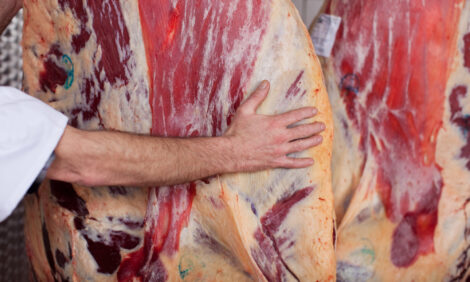



January Disease Kills 2000 Cattle in Zimbabwe
ZIMBABWE - At least 2000 cattle have died of January disease, also known as Theileriosis - a tick-borne disease common between December and March.According to AllAfrica, the Government is urging farmers to intensify dipping of their livestock as a prevention measure. Government has also intensified awareness campaigns in affected areas that include Goromonzi, Bindura, Chegutu and Chivhu.
The disease is spread through the bite of the brown ear tick. Ministry of Lands, Agriculture and Rural Resettlement's Department of Livestock and Veterinary Services director Dr Josphat Nyika yesterday confirmed the deaths.
He said the number deaths could be higher as some cases were not reported. Dr Nyika said his department was aware of the outbreak of the January disease and had deployed teams to assess the situation and educate farmers on preventive measures.
He said most farmers were not dipping their cattle, further worsening the situation. Dr Nyika said farmers, especially in Domboshava, preferred spraying cattle on their own, but were not following the correct procedures.
"The major challenges are irregular dipping," he said. "Most dip tanks are not on the recommended weekly dipping due to lack of dipping chemicals. There is also low turnout at dip tanks. Most farmers are not willing to take their cattle for dipping at the communal dip tanks. Some prefer conducting the operation themselves, but may do it in the wrong way and this is not effective in controlling ticks.
"The other challenge is that there are fake chemicals on the market and some farmers can not tell the difference as the packaging and labelling is the same. Some unscrupulous dealers are packaging tea and selling it as dip. Farmers should buy dipping chemicals from reputable retailers. There is also shortage of the drugs to treat the disease especially Burparvaquione," he said.
Farmers are supposed to pay a dipping fee of $2 per animal per year. Most farmers complain that the fee is too high and beyond their reach. Dr Nyika said farmers should consider the value of their animals and sacrifice to pay the dipping fees.
"It costs around $60 to buy treatment for tick-borne disease and the medication can only administer three heads of cattle," he said. "This means a farmer will have to fork out $20 to treat one cow. It is cheaper to pay $2 per animal per year than buy treatment."
"We are carrying out education and awareness campaigns and we need cooperation from farmers, especially through bringing their cattle for dipping. We have distributed 22,500 pamphlets to farmers in affected areas. All farmers should ensure their cattle are taken for dipping to ensure ticks do not mature to the stage of transmitting diseases," Dr Nyika said.
He said farmers should ensure the animal was soaked when spraying.
An animal requires at least three to five litres of dip wash. It is important to have the correct dilution rate that is recommended by the manufacturer. "For the treatment chemical to be effective, farmers should combine the chemical with tick grease," said Dr Nyika.
"The tick grease should be applied in the ear, under the tail and tail brush. Farmers can trim the tail brush. They should also seek assistance from local veterinary extension worker."
Signs of an animal affected by January disease include swelling of the lymph nodes under the ears and on the shoulder, cloudiness of the eyes, difficulty in breathing with froth from the nose and mouth.
The affected animal collapses and dies within few days. January disease is a notifiable disease in Zimbabwe and when suspected farmers are compelled by the law to report to the Division of Veterinary Services.
TheCattleSite News Desk


